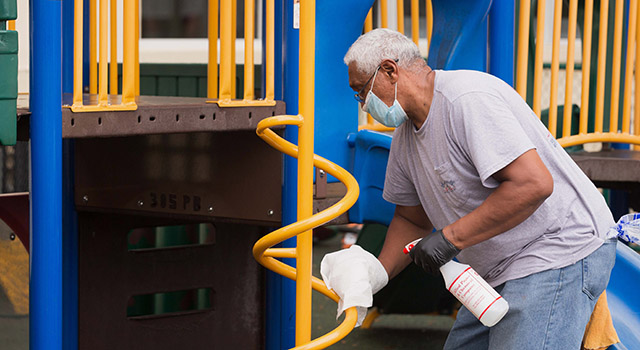By Tom Tracy - Florida Catholic
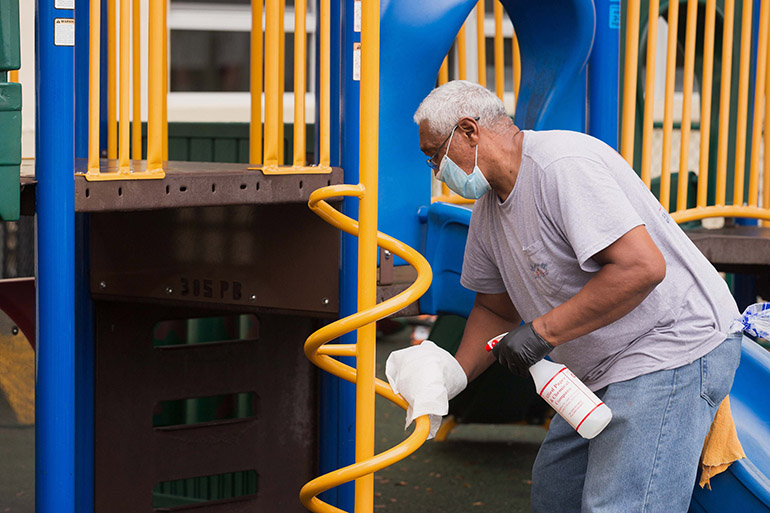
Photographer: TOM TRACY | FC
A staff person cleans playground equipment at the Head Start and Early Head Start program at Holy Redeemer Church in Miami, one of six such programs throughout Miami-Dade County operating at reduced in-class capacity during the COVID-19 global pandemic.
LIBERTY CITY | Having grown up in this Miami neighborhood and once a Head Start youngster here herself, Stephanie Brown steps up to check temperatures of visitors arriving at the child development program at Holy Redeemer Parish.
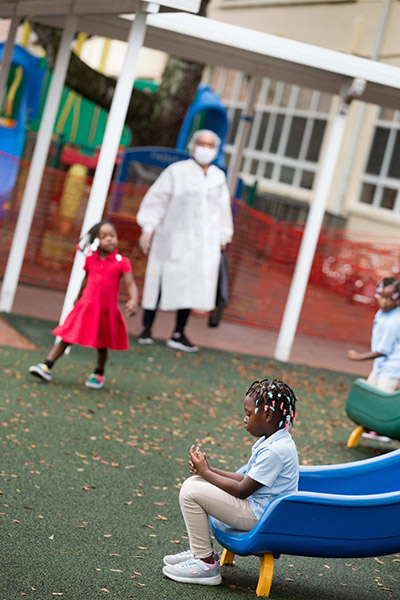
Photographer: TOM TRACY | FC
Staff clad in personal protective equipment look on as youngsters enjoy recess at the Catholic Charities-sponsored child development center/Head Start program at Holy Redeemer Church in Miami. It is one of six such programs throughout Miami-Dade County operating at reduced in-class capacity during the COVID-19 global pandemic.
Brown, who is regional director of the Catholic Charities-sponsored child development center/Head Start programs both here and at Centro Hispano Católico in Miami, could not have guessed she’d be running a Head Start program in 2020 while wearing full personal protective equipment amid a global pandemic.
“We want to be fully open for business whenever that decision is made, but until then we are adapting to the practices and protocols in place to keep the children safe, to keep the classrooms clean, constantly meeting with the teaching staff, sanitizing everything to make sure the transmission of germs is limited and changing shoes every day,” Brown said, rattling off some of the extraordinary measures the Head Start staff at six locations around Miami have been taking since last spring.
The COVID-19 pandemic has altered but not fully interrupted the Head Start programs operated by Catholic Charities of the archdiocese: Classes are smaller now, limited to no more than 10 youngsters, while others watch remotely at home with their parents. Social distancing measures are enforced and youngsters over the age of two wear masks, changing shoes as they come in from play time outside. Students maintain a personal “learning bucket” of toys and school materials that only they touch.
If any youngster or staff is found to have a high temperature — including their adult guardian dropping them off in the morning — they won’t be admitted to the campus until their temperature is normal.
Special filtration equipment, UV lighting and cleaning supplies have been deployed, while janitorial staff wipe down high-touch areas and open the classroom windows for 10 minutes every two hours to ensure an exchange of fresh air, thought to reduce the risk of infection spread. Meals are now served inside the classrooms rather than a cafeteria. Hand sanitizer supplies can be found everywhere.
“We make the best of it and stay happy while we maintain the teamwork to keep up the morale,” Brown said. “We know what we are here for, serving the parents and (the students).”
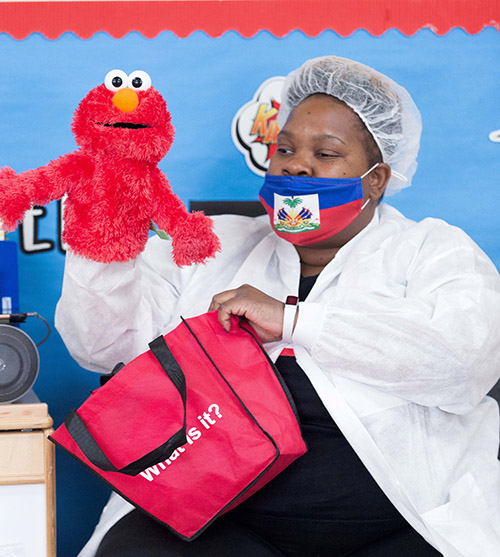
Photographer: TOM TRACY | FC
A staff person teaches while wearing personal protective gear at the Head Start and Early Head Start program at Holy Redeemer Church in Miami, one of six such programs throughout Miami-Dade County operating at reduced in-class capacity during the COVID-19 global pandemic.
The Child Development programs of the Miami archdiocese are designed to provide a safe, healthy and nurturing environment for children from infancy to preschool age, with the goal of school readiness and comprehensive social services for the family, according to Peter Routsis-Arroyo, CEO of Catholic Charities.
PRO-LIFE WORK
“There is a strong pro-life component to this work. We are taking infants to toddlers from economically deprived families and giving them a solid foundation in Head Start programs,” Routsis-Arroyo said, adding that Catholic Charities hopes to win Miami-Dade grant funding for an additional 170 student slots in Head Start.
And while no one knows for how long the COVID-19 pandemic will hamper daily life, the early part of this year and summer became a transitional period to the new normal of enhanced infection mitigation and social distancing within an educational setting.
“That was a good trial period for us as we had to figure out strategies for entrances and exits so we didn’t have people coming in all at one time; and our staff had to get accustomed to all the personal protection gear they wear now,” Routsis-Arroyo said.
“We are geared up for the long haul now, though it is still a hybrid year. We can take up to 10 children in a classroom with 10 more virtually at the same time,” he added. “But we are seeing more and more that parents are wanting to bring their kids in.”
Even as the pandemic worries are expanding again as winter approaches, Routsis-Arroyo and Brown noted that so far none of the staff or students at the Holy Redeemer campus have tested positive for COVID-19.
There was a temporary classroom closure at the Miami site after a teacher and student tested positive. The state Department of Health and other Head Start partners were notified, and the two persons and other students who may have been exposed were sent home to quarantine for two weeks. The sick child and teacher had to get doctor’s note and negative COVID-19 tests before they could return, according to Brown.
Such worries have meant that a number of families who are able to keep their child at home are doing so while watching the classroom activities through remote learning.
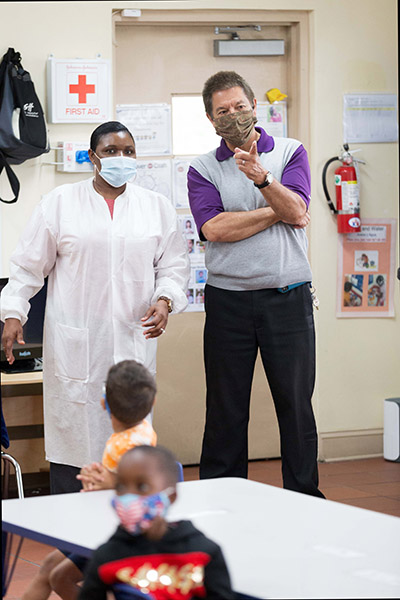
Photographer: TOM TRACY | FC
Peter Routsis-Arroyo, CEO of Catholic Charities in the Archdiocese of Miami, speaks with Gertrude Jean-Louis, education coordinator at the Head Start and Early Head Start program at Holy Redeemer Church in Miami. It is one of six such programs throughout Miami-Dade County operating at reduced in-class capacity during the COVID-19 global pandemic.
Brown said that the confusion around classroom safety is impacting local public schools as well, but that they are actively inviting families in the community to take advantage of available preschool places in the Head Start programs.
FOOD DISTRIBUTIONS
Apart from Head Start, Catholic Charities of Miami continues to be a conduit for charitable food distributions taking place at parishes and through St. Vincent de Paul councils around the archdiocese.
At least a million and a half pounds of state-provided food donations have been redistributed to the community through Catholic Charities, according to Gabe Tischler, emergency management specialist for the Florida Catholic Conference in Tallahassee.
Fear over the virus' resurgence, and relatively high state unemployment and underemployment, have prompted a steady demand for food assistance in South Florida, according to Routsis-Arroyo.
“Here we are in the middle of October and — just as we were when the pandemic was starting — the need is still there, the basic core need for goods is prevalent wherever you go,” he said. “People are out of work, collecting unemployment, maybe one of the spouses in a family is working and one not, and (food) costs have gone up. This has not slowed down.”
Mental health concerns have been shown to be of particular concern during the pandemic, and Catholic Charities continues to offer mental health services mostly through telehealth-based counseling. Reaching out to the elderly who may need that service, given their vulnerability to COVID-19, has been a challenge given the technological barriers.
“That population has been so impacted by the coronavirus and they are vulnerable, they are scared,” Routsis-Arroyo said.
FIND OUT MORE
- For more information about Head Start see: https://www.ccadm.org/sh_projects/child-development-services/
